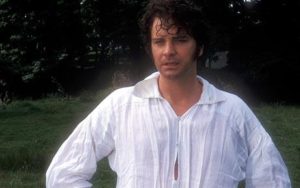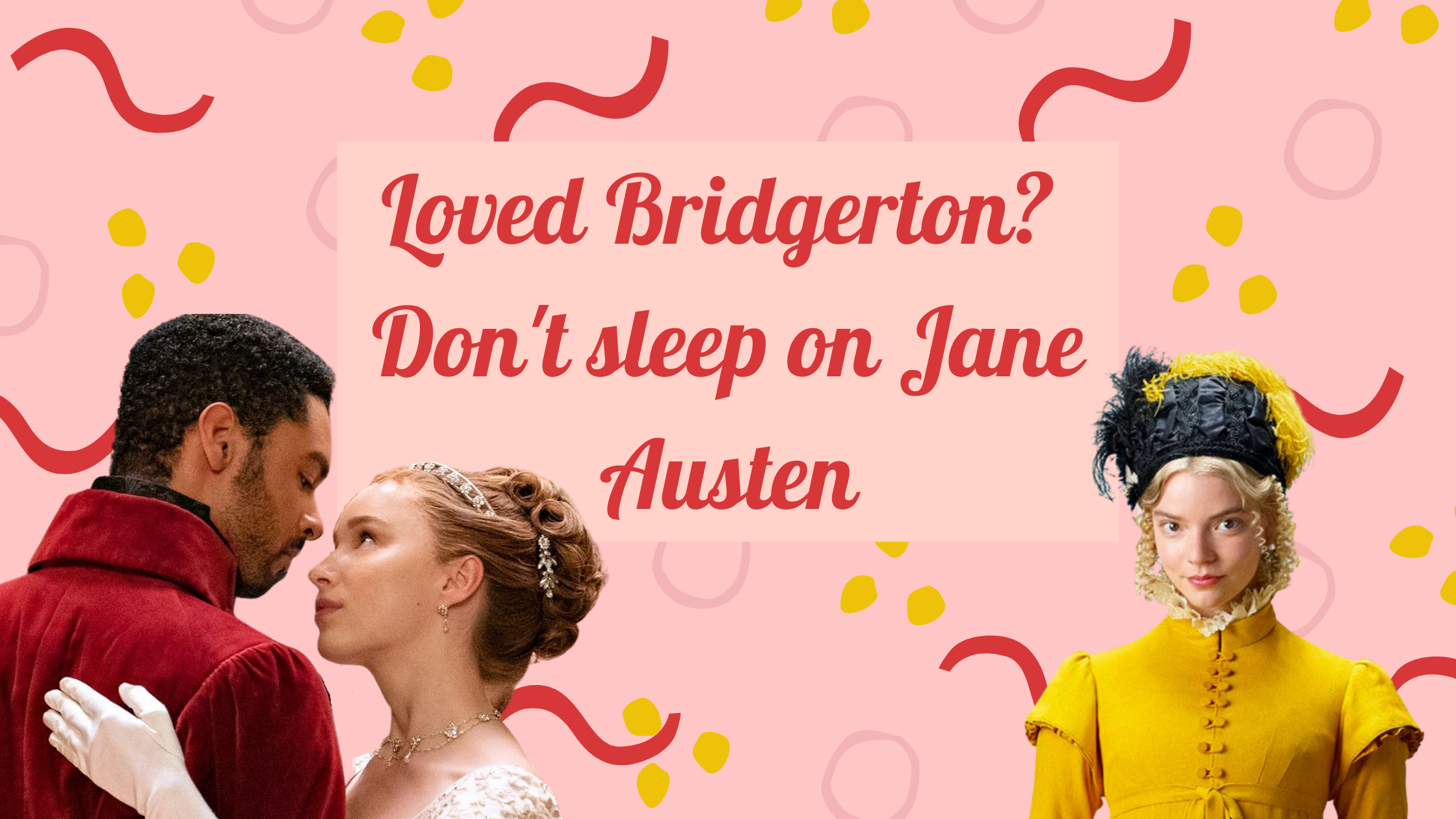Our cultural obsession for period dramas has been well and truly ignited as Regency drama, Bridgerton, landed on Netflix earlier this year.
Written and produced by Greys Anatomy creator, Shonda Rhimes, accompanied by perhaps one of the most memorable sound tracks of any recent series (I never knew I needed a string rendition of ‘Thank U, Next’ till I heard it), and saturated with salacious sex scenes – Bridgerton is a period drama with a facelift.
Fans of Jane Austen (which regular readers will know I am – still bitter that none of my friends would come with me to the museum last year in Bath), would have recognised a number of her key themes amongst the scandal and gossip of Bridgerton’s pulpy plot. Dashing suitors, elegant gowns and the stark reality that no woman in Regency era Britain was truly master of her own future and that marriage was, at the core, a purely economic proposition.
Those whose previous exposure to Jane Austen’s work mainly consists of Mr. Darcy in THAT lake scene, may be surprised to know just how much satire and cynicism Austen brought to her fairytale romances. She may not be the perfect feminist icon that we’d love to paint her as (no human woman can ever be), but, as Sophie Gilbert writes in the Atlantic;
‘she used the rituals of romantic comedy to expose what marriage really meant for women who had no other means of economic improvement, hoping that we’d see the injustice of it. She gave her heroines a kind of power and agency that she herself lacked.’.
She may have been writing romances, but she left readers under no illusions as to the kind of practical considerations which should inform their choice of suitor, and she held no bars when it came to using comedy as a tool for social criticism. It was this satirical, scathing and completely endearing tone that first sparked my love for Austen’s novels.

Jane Austen and female empowerment
Aside from brief dalliance with Pride and Prejudice as an ambitious young reader of about 12 years-old, who could make neither head nor tales of it but felt quite proud of the attempt, my first introduction to Jane Austen came in the form of a literature module at uni where we read Northanger Abbey. I was completely blown away by it.
Northanger Abbey, is a gothic parody in which Austen toys with the social anxieties and assumptions surrounding romance novels at the time. It follows the story of Catherine Morland, the moderately wealthy daughter of a clergyman who is sent to stay with well-connected relatives in Bath for the winter season. Here she encounters, for the first time, the bizarre routines of the season: balls, operas, and eyelash flutters with the aim of ensnaring the perfect match.
Like Shonda Rhimes, Austen does not shy away from the realities of a woman’s position at this time. In Northanger Abbey, Catherine’s love-match, Henry Tilney, proclaims with a striking level of insight (though little empathy) that, when it comes to marriage ’man has the advantage of choice, women only the power of refusal.’. And for Catherine and Daphne, even this meagre power is often denied to them as the men around them appear completely unable to view them as agents of their own lives.
‘Gothic romances’ were inextricably linked to women, as writers, readers, and protagonists of the genre. This meant they were often dismissed as frivolous and emotional. (The male protagonists in Northanger Abbey either deny having read these novels despite knowing their plots in suspicious detail, or admit to reading them but speak of them dismissively.)
The fear around gothic romances was that women would read these tales of beautiful, vulnerable young women entrapped in grand castles by cruel husbands or wealthy uncles literally, as lessons to live by, and Austen’s protagonist, Catherine, does just this. During a stay at, Henry Tilney’s family home, she becomes mistakenly convinced that his father, General Tilney, had been responsible for the death of his mother some years earlier. While her wild theories about the General proved to be untrue; in the end she decides firmly that ‘in suspecting General Tilney of either murdering or shutting up his wife, she had scarcely sinned against his character, or magnified his cruelty.’, The General may not have committed the crimes she imagined but she comes to recognised that his tyrannical rule over his family along with his greed and rudeness, make him every bit the villain she first envisioned.
Gothic romances, although potentially problematic for modern feminist readers, were at the time somewhat of an instrument of female liberation in a deeply patriarchal society, teaching women to question the male figures of authority around them. Jane Austen recognised the power and influence of popular culture and repeatedly used her novels as Trojan horses of empowerment – or at the very least, honesty – for her young female readers.
She may have married off her heroines in the end, but not before she had clearly and frankly described their vulnerable position in this quest, and the economic implications that a young woman should be aware of before entering into any such proposition.
Bridgerton: mating season in the ton
The plot of Bridgerton shares much of Austen’s stark honesty about a woman’s fate in Regency Britain. Daphne is determined to find a love-match like her parents, while her brother, daunted by his new responsibility as head of the family following their father’s death, blunders about with complete disregard for any of her wishes in his attempts to secure a good economic match for the family.
Marina faces the consequences of being a young woman in love without the benefit of any kind of sex education, finding herself in the age old issue of pre-marital scandal – the burden and blame of which somehow always falls upon the woman.
And young Eloise dreads her ‘debut’ into the marriage market the following year and finds herself quite determined to make her own way in the world (however hopeless she may be in her attempts).
Similarly to the righteous attitude of many Austen ‘heroes’, the Duke is incredibly critical and dismissive of the ‘ambitious mamas of the ton’. He looks down on them as they desperately hope their daughters could make a match with such a highly titled gentleman as himself. And certainly they provide a comedic element in the Shondaland production with their excessively coloured gowns and all their swanning and swooning around any eligible man like a flock of exotic birds.
But what does the dear Duke expect? This was, of course, nothing more than a ritualised mating process, more like something we would see narrated by David Attenborough than a love story. The opening ball where the young women were presented in front of the queen (a royal tradition that was only done away with by our current Queen Elizabeth II in 1958), the carefully coordinated dance cards, the public promenades, and of course, the gregarious gowns that cost these high-class families quite a pretty penny each season, were all meticulously planned steps in a delicate social dance. All in the hopes of securing the hand of the most eligible bachelor in town, and more than that, securing a stable and comfortable future for themselves and their families.
First comes love, then comes marriage, then comes...?
However, in a diversion from Austen’s tropes and traditions, Bridgerton does not end with Daphne’s marriage. They don’t simply say ‘I do’ and live happily ever after, as is the fate of every Austen heroine (yes, all of them – apologies for the spoiler but they have been published for at least 200 years so come on!). Bridgerton does something different, here we see the realities of marriage after the big day. (I know, I know, ‘reality’ might be a bit of a stretch considering Daphne’s mind-blowing introduction to sex.)
But even Daphne suffers the consequences of her culture’s inability to educate or prepare women beyond the grand aim of marriage. ‘You sent me out into the world no better than a fool’, Daphne accuses her mother in a tearful exchange, ‘You taught me how to play pretend but nothing of the realities of married life, of marital relations’.
And she was quite right. Daphne’s naivety and innocence might have made her the pure, virginal ‘diamond’ that Queen Charlotte declared her to be in episode one, but it did nothing to prepare her for the rest of her life, once her ticket to stability had been secured. Something which Jane Austen herself could arguably be accused of.
Bridgerton fans, don't miss out on Jane!
Just as Austen subverted the conventions of gothic romance in Northanger Abbey, Bridgerton similarly changes the game when it comes to period dramas. Its modern soundtrack, raunchy sex scenes, and colourblind casting are a far cry from what we have come to expect from more traditional period dramas.
And beyond these aesthetic choices, Bridgerton also changes the script on Austen’s demure and very PG English romances, touching on subjects that she would never have dreamed of. Namely the experiences of women who make a living for themselves through their craft, or those who’s rank and high-status meant they had to hide their true selves, and it briefly explores those liminal spaces where the class divide becomes permeable, if only for a night.
But, while Bridgerton may stray into broader, and more bold territory (as it well should!) we can’t dismiss the impact of Austen’s entertaining and educational novels. As a woman who never married herself, and who, along with her mother and sisters experienced relative poverty because of this after the death of her father, she was all too aware of the precariousness and vulnerability of womanhood.
People were right to worry that fiction would teach women to question the world they find themselves in. Austen wrote ‘women’s literature’. Her novels were considered ‘fashionable’, receiving only moderate success in her lifetime, and in them, she taught women they should strive for a love-match and get lost in the romance but in doing so, they should never neglect to consider their own needs first.
Hundreds of years later, I read her novels in awe and admiration. I may live in a different world than Catherine Morland, Emma Woodhouse, or Anne Elliot, but I see myself in them – their ambitions, fears, heartaches, and naive tendency towards hopeless romanticism. She has an uncanny talent for marrying sheer pulpy plot with cuttingly insightful observations on the human character.
Any readers who loved Bridgerton would be wise to give her a chance.
